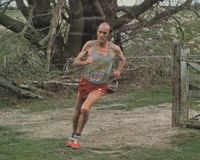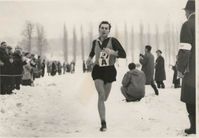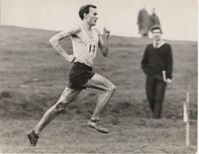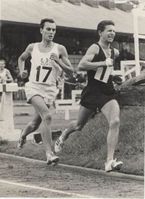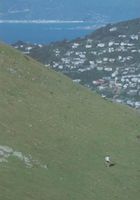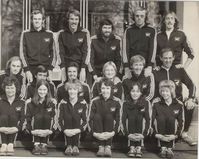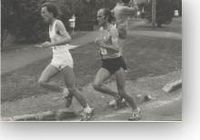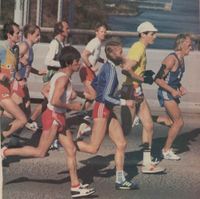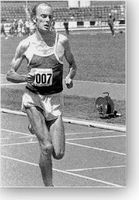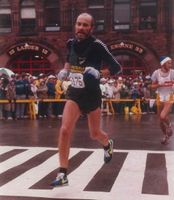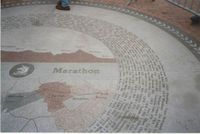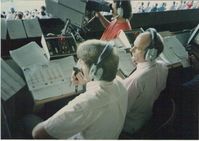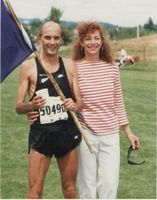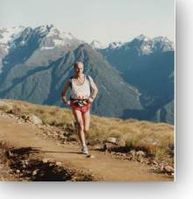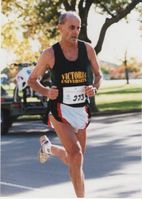Roger Robinson
http://roger-robinson.com/about/runner.shtmlAbout Roger the Runner
England and New Zealand world championship representative; masters world champion; masters record-breaker (over-40 & over-50) at Boston, New York, Vancouver and other marathons.
Short version:
A competitive runner for 63 years (so far), I raced at elite level, including masters, for almost 30. I've never counted my races, but there must have been well over a thousand. To my genuine surprise, after a knee replacement, I'm into a new phase of training and racing, placing yet again in my age-group, including wins in the US masters 5K and 10K championships, and times that are approaching world class for age. (If you think the upper age groups are not competitive, wait till you get there.)
From being a useful school and club runner, I improved to win the British Universities and Eastern England cross-country championships, run some national level track times, and represent England, and later New Zealand after the good decision to move there in my late twenties. In my forties and fifties, I won several world and national masters championships, and set age-group records in major marathons: 2:18:45 at Vancouver at 41 (a record which still stands), 2:20:15 at Boston at 44, and 2:28:01 at New York at 50. In the mid-fifties, my right knee retired, and eventually prevented me from any running. A knee replacement was followed by an unexpected late-life revival as a runner.
I have always written about running - at its cutting edge and its rich history. I've also worked for forty years as announcer and commentator, including stadium announcing at two Commonwealth Games and TV at Olympics and World Championships. I'm a highly regarded speaker on running, sometimes a coach, and once even served on a national governing body (which was like Alcatraz).
At greater length
(Disclosure: I once taught a graduate course on "Biographical Fictions")
England
As a boy in the London suburbs after World War 2, I used to watch athletics meets at the local cinder track, Motspur Park. It was open to the public on Sunday mornings. I was small and skinny, and always came dead last in sprint races. So one Sunday at the track, at the age of nine, I ran three miles - twelve laps. My mother used to say I spent that Sunday afternoon in bed, something that has been replicated more than once over the years.
At school and university, I was enthusiastic and persistent, and loved cross-country, but had limited talent and strength. I arrived at Cambridge University at the beginning of a vintage era, and although I raised my sights and benefitted from the training company, the inspiration and support especially of Mike Turner, and from team runs like the John o'Groats to Land's End relay, I was never more than good B team. My first improvement and first big win came as a young teacher, when I won the Surrey county cross-country championship in deep snow in 1963. It was a total surprise - my best previous placing was 31st. I was training more consistently now, and when I went back to Cambridge to work for a PhD, 1964-67, I kept slowly improving. But the English National in 1966 was again a race beyond my dreams, when I qualified for the England team for the international cross-country championship.
That year my track times also came down to national class. I got second in the Southern 6 miles (28:48) and won the Surrey 3 miles championship in a record 13:40, probably the best track race of my life. Both those memorable races were on Motspur Park, the same cinder track where I had struggled through my Sunday morning folly as a 9-year-old.
In 1967, my last year as a graduate student, came another nice win - the British Universities cross-country championship - restitution for failing to make the Cambridge A team as an undergraduate. These last years in England also gave me the Eastern cross-country title, and some good road times - 48:18 for 10 miles, and 1:45:49 in my only attempt at 20 miles. That year, 1968, I thought of doing a marathon, but the pressures of my first lecturing job, at Leeds University, finishing the PhD, and preparing to move a young family to New Zealand, cut into the training miles.
Christchurch twilight
I loved New Zealand from the first run in Hagley Park, and things started well. Despite limited training during the sea voyage, I won the Canterbury 10 miles road title in November 1968. After that, almost nothing went right. I broke a foot in 1969, suffered mononucleosis 1971-73, and ripped a knee ligament in 1973. I had great friends, good sessions, and pleasing races, and there was huge strength and support in Canterbury running in those years, but I could not get back to my 1966-8 level. It seemed, as one journalist annoyed me by writing, that at 35 I was "in the twilight of a distinguished career."
But then, just as an alternative sporting role as stadium announcer opened up at the 1974 Christchurch Commonwealth Games, I found some zest again as a runner. My last year in Canterbury I won the road champs again, and the big "Jane Paterson" race, got third in the very strong cross-country champs, captained the Canterbury team to Nationals, was President of the University club's best-ever season, and ended my time there by breaking the record in the "King of the Mountain" road race by 61sec. The "King Robinson" headlines gave me a regal entry to Wellington.
Wellington dawn
I grew strong on Wellington's hills and stayed healthy in a climate where germs get blown out to sea in a microsecond. Despite the pressures of a full professorship and appointments as Head of Department, Dean, etc, as well as slaving at the microphone every summer Saturday as track announcer, my running revival continued, and the years from 36 to 45 (1975-84) were among my best. In my late thirties, I won the Wellington Road Champs four times, once in a record 48:48 (16K). I also won the Wellington Cross-Country twice, and never placed lower than third, all on very different courses; and had the same placings in the severely mountainous Vosseler Shield. I got 5th, 6th and 8th in the national cross-country champs at a time when New Zealand was the world champion nation, so this was no small pond to be a fish in. Nationally my best result was second to Jack Foster in the 1976 road champs (49:02 for 16K on a windy day). That, with my cross-country results and a 29:34 10,000m PR on the track, earned me a place in the New Zealand team for the 1977 world championship cross-country in Germany. Again, I had gone beyond my wildest dreams, representing New Zealand, and returning to international level eleven years after I represented England.
I kept mixing it near the top. In August 1978, I ran a 12K road relay leg faster than the lap record, faster than Ballinger, Foster, Gray, Rose and other NZ legends, one of my lifetime best races, only to find myself overshadowed by a dazzling run from a young Australian called Rob de Castella. At 40 (1979) I got 5th in an epic NZ Road Champs. I was awarded "New Zealand Harrier of the Year" and "Wellington Athlete of the Year." And in the 1980 NZ veterans' track champs, I won my first masters titles, shortly before going on overseas leave for 8 months. The twilight was still a bright one. And a new running life was beginning.
World champion and marathon novice
1980 proved an epic year. I had good mid-summer races in America and England, especially getting third overall in the excellent Hospital Hill Run half-marathon in Kansas City (1:10:38 in stifling humidity, a masters record that lasted twenty years), and winning the British masters 5000m track title. Fourth overall in a classy half-marathon (1:08:48) confirmed that I was as close to England's younger best as in 1966-68. But my main objective for the year was the world masters 10K road champs in Glasgow, August 1980.
I never like naming my "greatest race," but this was certainly a candidate. I decisively beat top global competition, by very hard running and precise tactics - a surprise break uphill just after halfway, to drop the hot favourites, Taf Davies (GB) and Pierre Voets (Belgium). The course had been extended at the last minute and was 600m over-distance. So my 31:09 was worth probably 29:20 (at age 41). It is one of the few days when I felt 100% satisfied.
Then back to USA, where two wins against the best over-40 North Americans, Derek Fernee, Herb Lorenz, and Dan Conway (1:04:10 20K and 47:23 15K) made me feel indisputably world champion. A new challenge was ahead, too- New York, for my first marathon. In my running diary I described my early 5:25 pace as "steady training speed, enjoying the scenery." Passing Lasse Viren and Marti Vainio were good moments. Coming through strongly after halfway, despite the killer headwind up Fifth Avenue, I placed 47th (out of 13,000+), 1st Master, in 2:22:12. My running diary commented: "A long-delayed debut, but this was the right place, and the right way, to do it."
Although I had made only two transient visits to America, I was ranked Number 1 Master in "The Runner" annual listing.
I arrived back in New Zealand in late December hammered by a bad flu, a pity, as the world masters' champs were there in early January. I could not defend my 10K road title, but got out of bed to win the cross-country and place second and fourth in the 10,000 and 5000 track.
Vancouver, Japan, Fiji, Canberra & New York: 1981-84
These were very good years, with my new life as a marathoner the main running focus. (At work, I was Faculty Dean, a demanding job on top of lecturing.) In April 1981, Ross Jackson and I did a marathon race as training one Sunday, running an unstressed 2:36:54. So I was ready for the Vancouver International Marathon in May, designated the "North American masters championship." In near-freezing rain, I ran 2:18:45, for third overall, and a win in the masters by six minutes. My time still stands (2015) as the masters record, and would have won the 2011 race, including its invited Kenyan professionals, by two minutes. I was invited back for my 30th anniversary, that's why I know. Vancouver 1981 was to be my fastest marathon, though I felt I was only just beginning.
Aged 41-45, I kept racing the full New Zealand inter-club programme, getting pushed back only a place or two by the rising generation in open competition, and remaining unbeaten against all comers in the over-40 for five years - track, road and country. And this was a vintage era in New Zealand masters running, with ten of us running marathons under 2:30. Two wins in the national masters cross-country, in 1981 and '82, were among my best races ever. And the 1983 road champs (12K) must have been one of the best masters fields ever assembled. I called it the Gunfight at OK Corral. On a course with a tough hill, sixth home broke 40mins. I won, in 37:46, from Ron Robertson, Gerald Dravitski and Dave Sirl, a race as hard and competitive as my Glasgow world champs win.
Other highlights of these years:
- At the 1982 world masters road champs in Japan, I got two good seconds, behind Tim Johnston, a former Olympic marathoner for Britain, despite a bad fall (tripped by officials, would you believe) at the start of the marathon.
- In the wind-swept Winstone Marathon, in Auckland, November 1982, I came through to third overall, behind Dick Quax and Trevor Wright, and beat Dave Sirl and a top masters field (2:28 only got third). Quax (2:17) commented that "fast times were impossible in the wind," and my 2:22:45 was certainly worth better. One of my few regrets is that I never had fast conditions for a marathon. I was regularly beating 2:15-2:16 men, and that is where my PR should have been.
- As a race prize I got fares to the Oceania masters champs in Suva, winning three titles despite all the distractions of the South Pacific. My track 10,000 on a fiercely hot day, 31:34.2, is the Fiji all-comers record. Admittedly, not many people run track 10,000s in Fiji.
- I won a half-marathon outright in October 1982, in 68:19, and 30:37 for track 10,000 at the Zatopek meeting in Melbourne, OK times at 43.
- The Canberra Marathon in April 1983 gave a 2:26:50 masters record, and also proved life-changing. My co-speaker at the pre-race seminar was Kathrine Switzer. We married in 1987.
- There was now incentive to spend some university breaks in America. My first trip produced a 24:52 five-miler in Ottawa, 47:11 15K at the Cascade Run-Off, and 31:34 10K at Peachtree. Antonio Villanueva (Mexico) beat me in the last two, but I had passed him at Cascade before a calf popped.
- Victoria University won the 1983 Wellington cross-country champs for the first time in 30 years. Club running was still important to me, and in retrospect it's pleasing that every club team I have run for has improved.
- On a freezing New York day in January 1984, with icicles hanging like stalactites from the Harlem rocks, I ran 1:05:10 for 20K.
Boston
In 1984 the Boston Marathon coincided with Easter, so I could get a week away from university duties. I had a near-perfect race. Wellington had prepared me for the cold rain and headwinds, and the hills, which I relished. I judged the pace right, won the masters by five minutes in a record 2:20:15, and placed 31st overall, beating many contenders for their national Olympic teams, including New Zealand's. The masters field was also deep - sixth master ran 2:28:42. At the time, I was just happy the hard training had brought me back to 1980-81 pace, and enjoyed the celebrations. But in retrospect, it was perhaps my most significant race, the simple sound-bite that everyone remembers. And in its centenary year Boston set up the Marathon Monument in Copley Square, and my name is there. It's the only way I know to get my name on a memorial without being dead.
Another twilight, another dawn
For ten years I had held the tide high, but now it was ebbing. There were decent races - a 1:20:34 25K in Bruges, a 51:16 16K in Wellington - but my last truly elite-class run was the 1984 New York Marathon. In that year's suffocating 96% humidity, I ran sane and strong to finish second master in 2:27:33 (aged 45).
I was already suffering pain from an inflamed groin, and soon it stopped me completely. 1985 was my worst year since 1971. The only notable result was on my aging road bike - second in the New Zealand veterans 25-mile time trial. In 1986 I was racing again, but frustrated by recurrent injuries. I sneaked a half-fit 2:33:39 marathon in Christchurch. Best result in this down time was the 1987 Peachtree 10K. At 48, I was still good for 32:15, and 6th master in an elite field.
1988 was a busy year, with organizing Katherine Mansfield centennial conferences in Chicago and Wellington, and doing high-level TV commentaries at the world cross-country in Auckland and Olympics in Seoul. But I was also able to train consistently at last. At 49, I won the Wellington vets' cross-country again, to the annoyance of nine years of younger rivals. I ran a 1:13:18 half-marathon in England, a 26:16 5-miler in America, and ended the year with a 32:03 10K in Wellington. I began to look forward to turning 50.
Over the New Zealand summer of 1988-89 I had my best training build-up for years, and the results came: second in the City of Wellington half-marathon in 1:12:59, and two 10K masters wins in 31:44 and 31:34, best since 1983. I was ready.
Turning fifty
It was great. I was based in America from June, ran 17 major races, and won the over-50 in all but one (and that was on the track). I won two world championships, and set nine (I think) over-50 records. Often, as at Maggie Valley and the Virginia 10-miler, I won the masters overall. Once I had the pleasure of over-hearing some runners say the results posted on the board had to be wrong because this supposed over-50 had been given a crazy fast time.
Highlights at 50:
- World vets' champs, Eugene -good victories in the 10K road and 10K cross-country. On the road it was an epic tactics + guts win over Jim McNamara (Ireland). Jim had his revenge by outsprinting me in the track 10,000m, my only loss all year.
- 8K: 25:44, Alexandria Moonlighter, and 26:10, Maggie Valley
- 10K: 32:34, Peachtree
- 15K: 50:17, Utica Boilermaker, and 49:35, Tulsa Run
- 10-miles: 55:11, Virginia 10 miler
- half-marathon: 1:10:17, Philadelphia Distance Run
- marathon: 2:28:03, Twin Cities, and 2:28:02, New York City (record)
Last laps
In early 1990, at 51, I was training as hard as I had ever done, and had some good races as build-up for the American season. But injury struck just before departure. That frustrating year produced only two U.S. over-50 wins, both at 15K, the Cascade Run Off (50:07) and Tulsa Run.
So this long story was at any rate at the beginning of the end. Through my fifties, between increasing injuries, there were enjoyable and sometimes successful races, sometimes at events where I was also guest speaker - the Tulsa Run and Maggie Valley in USA, the Nelson half-marathon and Luxmore Grunt in New Zealand. In New Zealand the pattern I had always loved continued - inter-club relays, championships, local races, training with friends high on Wellington's spectacular hills. It's like being a bird.
The race that finally injured me was the Mangaroa half-marathon, in Upper Hutt, near Wellington, in April 1995. At 56, I placed 10th overall, and won the over-50, in 1:17:29. But my long-suffering legs said Enough. The right knee was never pain-free after that day. I did it further damage in 1996, when the 100th Boston lured me to run one more marathon, a painful folly that I have never regretted.
I still hobbled through some races. At 58, I ran 1:20:19 at the 1997 Nelson half-marathon, which won me the New Zealand 55-59 masters, my last national championship (until 2015). By my sixties, I had to run mainly on soft surfaces, and not at all downhill. I had private courses up steep hills in Wellington and New York State. Even then, there were occasional perverse returns to racing. I won my age-group in some 5-milers in Central Park, New York, in the Kingston Classic 10K in 2007, after we moved to that area, and several times in cross-countries in Van Cortlandt Park, New York. I enjoyed returning to my grass roots in cross-country. But the knee pain was going from severe to unbearable. So finally there came a year, 2008, the first since 1952, when I did not run a race. In 2009-10, I couldn't run at all.
Footnote (or Kneenote)
But then, like the demon from under the stage, I popped up again. Struggling in acute pain, I was finally convinced that I had to get replacement surgery if I wanted to stay out of a wheelchair. In January 2011, a brilliant surgeon, Russell Tregonning in Wellington, New Zealand, inserted a partial ("unicompartmental") right knee replacement. By April I could do a shuffly jog for a few steps. I added slowly to that. On the anniversary of the surgery, in January 2012, I ran one hour - see "Return to Running: How to Run a PR in one slow hour." I kept running a little faster, slowly rebuilding the lost leg strength, in constant terror in my Wellington months that Russell Tregonning might see me, since his wise advice was not to run. Oh well - plenty of students and others have ignored my wise advice over the years. Mainly still biking, I ran at first only every four or five days, increasing that over four years to where I now run virtually every day, quite often hard, and the bike is gathering dust. The knee, named "Russell" in honour of the surgeon, so far shows no sign of wear. I had no hope of ever racing again, yet by late 2015, Russell and I have improved dramatically, racing hard every three or four weeks, usually winning the age-group. Currently (July 2016), Russell and I have what I call joint PR/PB's of 22:16 5K, 47:38 10K and 1:48:57 half-marathon. It's a fascinating experiment and a very pleasing late-life bonus.
Another bonus is that a neighbour and friend, Dennis Moore, who took up running four years ago for the sake of his dog Radar (aka "Coach"), asked me to advise him in an attempt to qualify for the Boston Marathon when he turns 70 in 2017. Dennis too is improving dramatically, though has so far narrowly missed the BQ.
